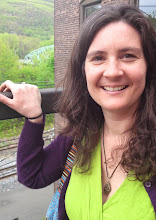First I saw the PA who was startled by how well I was doing, "You have a very large herniation. Many people are crying in these appointments." I was proud. I told him about the acupuncture, cranialsacral, physical therapy and my inversion table. He said, "Your doing so well, it is a testament to all of your complementary therapies." He wasn't sure if the surgery would help the foot because he thought it was a subtle combination of motor, strength and sensory nerve issues, which can take time to repair.
So, I was pretty clear I wouldn't do surgery.
Then Dr Oh came in and had me look at the MRI. The disk was just bulging in the initial 2009 MRI and then 2012 the disk is all splurched out and compressing the nerves and almost blocking the channel of cerebral spinal fluid. Dr Oh calmly told me that even though I was doing well, he wanted to do surgery to prevent Caudal Equina syndrome, which is when the disk compresses the caudal equina (horse tail) which is the nerve root for all the nerves that innervate the lower body. So he said if I herniated any more I could lose bowel, bladder, leg and sexual function. Actually he said, "private area function."
I could feel the physical response of fear building and then I started to cry. We sat there for a bit while I recovered and then I asked lots of questions about surgery, recovery, and risks, which he answered. They only offer surgery to 10% of the patients who come in and he really thought I should get it done. I was mostly appalled about taking a month off work. I have almost no sick time because I took time off for my sepsis last year and then time when I first herniated the disk this spring. I could not imagine how we could do it financially.
He pointed out that the risk and recovery from surgery was much less than from the syndrome itself.
I was skeptical, stunned and confused.
He told me he wanted to do the surgery as soon as possible, in the next week or so. He would fit me in. He said if I was his sister he would want me to have it right away. He told me that if I waited and the disk did herniate I would need emergency surgery and it might not work. (Actually he didn't say it might not work I found that on WebMD later.)
I called Rob, crying from the elevator. I called and left messages on my parent's and sister's voicemail. I thought maybe he was somehow wrong.
It was the afternoon before school started so I had to hold it together, but Georgia was a bear. I am realizing she is so sensitive to the energy around her, she knew something was happening even thought I didn't talk about it in front of them.
Over the week I talked to people, looked it up online and emailed with my PT and the doctor who looked at my MRI earlier. I saw my cranial sacral practitioner and let it sink in. Rob and my family were ready for me to have the surgery immediately. I read this article from WebMD and it really scared me.
http://www.webmd.com/back-pain/guide/cauda-equina-syndrome-overview
Living With Cauda Equina Syndrome
If permanent damage has occurred, surgery cannot always repair it. Your cauda equina syndrome is chronic. You will need to learn ways to adapt to changes in your body's functioning. You'll find that both physical and emotional support is essential.Try to involve your family in your care. Many professionals can also provide you support. Depending on your limitations, you can seek help from:
- An occupational or physical therapist
- A social worker
- A continence advisor
- A sex therapist
If you have loss of bladder or bowel function, the following tips may help:
- Use a catheter to completely empty your bladder three or four times a day.
- Drink plenty of fluids and use good personal hygiene to prevent urinary tract infections.
- Check for waste and clear the bowels with gloved hands. If needed, use glycerin suppositories or enemas.
- Wear protective pads and pants to prevent leaks.
Holy Shit!
Ok, then.
When I asked my intuition it said yes. Surgery. Yes. Yes. Every time. So I called and scheduled it for Monday September 17th.




No comments:
Post a Comment